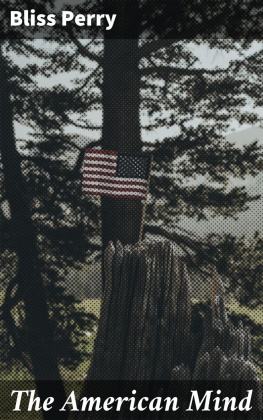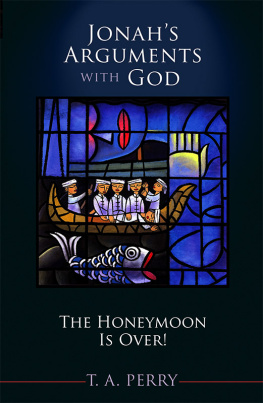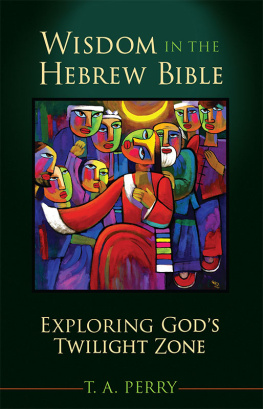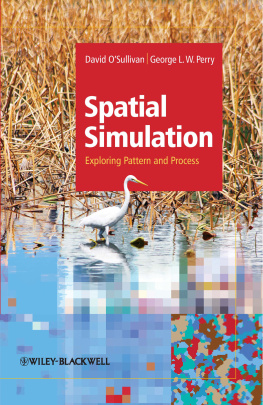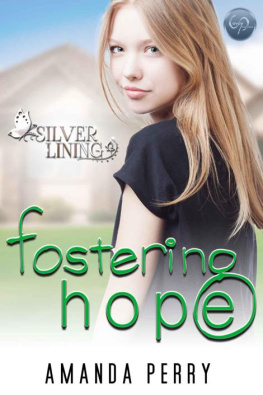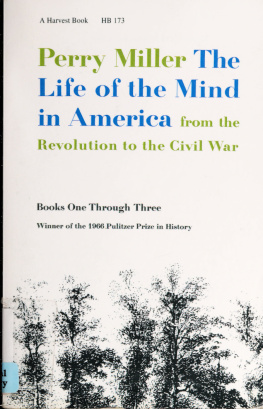Preface
Table of Contents
The material for this book was delivered as the E. T. Earl Lectures for 1912 at the Pacific Theological Seminary, Berkeley, California, and I wish to take this opportunity to express to the President and Faculty of that institution my appreciation of their generous hospitality.
The lectures were also given at the Lowell Institute, Boston, the Brooklyn Institute, and elsewhere, under the title "American Traits in American Literature." In revising them for publication a briefer title has seemed desirable, and I have therefore availed myself of Jefferson's phrase "The American Mind," as suggesting, more accurately perhaps than the original title, the real theme of discussion.
B. P.
Cambridge, 1912.
I
Race, Nation, and Book
Table of Contents
Many years ago, as a student in a foreign university, I remember attacking, with the complacency of youth, a German history of the English drama, in six volumes. I lost courage long before the author reached the age of Elizabeth, but I still recall the subject of the opening chapter: it was devoted to the physical geography of Great Britain. Writing, as the good German professor did, in the triumphant hour of Taine's theory as to the significance of place, period, and environment in determining the character of any literary production, what could be more logical than to begin at the beginning? Have not the chalk cliffs guarding the southern coast of England, have not the fatness of the midland counties and the soft rainy climate of a North Atlantic island, and the proud, tenacious, self-assertive folk that are bred there, all left their trace upon A Midsummer Night's Dream, and Every Man in his Humour and She Stoops to Conquer? Undoubtedly. Latitude and longitude, soil and rainfall and food-supply, racial origins and crossings, political and social and economic conditions, must assuredly leave their marks upon the mental and artistic productiveness of a people and upon the personality of individual writers.
Taine, who delighted to point out all this, and whose English Literature remains a monument of the defects as well as of the advantages of his method, was of course not the inventor of the climatic theory. It is older than Aristotle, who discusses it in his treatise on Politics. It was a topic of interest to the scholars of the Renaissance. Englishmen of the seventeenth century, with an unction of pseudo-science added to their natural patriotism, discovered in the English climate one of the reasons of England's greatness. Thomas Sprat, writing in 1667 on the History of the Royal Society, waxes bold and asserts: "If there can be a true character given of the Universal Temper of any Nation under Heaven, then certainly this must be ascribed to our countrymen, that they have commonly an unaffected sincerity, that they love to deliver their minds with a sound simplicity, that they have the middle qualities between the reserved, subtle southern and the rough, unhewn northern people, that they are not extremely prone to speak, that they are more concerned what others will think of the strength than of the fineness of what they say, and that a universal modesty possesses them. These qualities are so conspicuous and proper to the soil that we often hear them objected to us by some of our neighbor Satyrists in more disgraceful expressions.... Even the position of our climate, the air, the influence of the heaven, the composition of the English blood, as well as the embraces of the Ocean, seem to join with the labours of the Royal Society to render our country a Land of Experimental Knowledge."
The excellent Sprat was the friend and executor of the poet Cowley, who has in the Preface to his Poems a charming passage about the relation of literature to the external circumstances in which it is written.
"If wit be such a Plant that it scarce receives heat enough to keep it alive even in the summer of our cold Clymate, how can it choose but wither in a long and a sharp winter? a warlike, various and a tragical age is best to write of, but worst to write in." And he adds this, concerning his own art of poetry: "There is nothing that requires so much serenity and chearfulness of spirit; it must not be either overwhelmed with the cares of Life, or overcast with the Clouds of Melancholy and Sorrow, or shaken and disturbed with the storms of injurious Fortune; it must, like the Halcyon, have fair weather to breed in. The Soul must be filled with bright and delightful Idaeas, when it undertakes to communicate delight to others, which is the main end of Poesie. One may see through the stile of Ovid de Trist., the humbled and dejected condition of Spirit with which he wrote it; there scarce remains any footstep of that Genius, Quem nec Jovis ira, nec ignes, etc. The cold of the country has strucken through all his faculties, and benummed the very feet of his Verses."
Madame de Stal's Germany, one of the most famous of the "national character" books, begins with a description of the German landscape. But though nobody, from Ovid in exile down to Madame de Stal, questions the general significance of place, time, and circumstances as affecting the nature of a literary product, when we come to the exact and as it were mathematical demonstration of the precise workings of these physical influences, our generation is distinctly more cautious than were the literary critics of forty years ago. Indeed, it is a hundred years since Fisher Ames, ridiculing the theory that climate acts directly upon literary products, said wittily of Greece: "The figs are as fine as ever, but where are the Pindars?" The theory of race, in particular, has been sharply questioned by the experts. "Saxon" and "Norman," for example, no longer seem to us such simple terms as sufficed for the purpose of Scott's Ivanhoe or of Thierry's Norman Conquest, a book inspired by Scott's romance. The late Professor Freeman, with characteristic bluntness, remarked of the latter book: "Thierry says at the end of his work that there are no longer either Normans or Saxons except in history.... But in Thierry's sense of the word, it would be truer to say that there never were 'Normans' or 'Saxons' anywhere, save in the pages of romances like his own."
There is a brutal directness about this verdict upon a rival historian which we shall probably persist in calling "Saxon"; but it is no worse than the criticisms of Matthew Arnold's essay on "The Celtic Spirit" made to-day by university professors who happen to know Old Irish at first hand, and consequently consider Arnold's opinion on Celtic matters to be hopelessly amateurish.
The wiser scepticism of our day concerning all hard-and-fast racial distinctions has been admirably summed up by Josiah Royce. "A race psychology," he declares, "is still a science for the future to discover.... We do not scientifically know what the true racial varieties of mental type really are. No doubt there are such varieties. The judgment day, or the science of the future, may demonstrate what they are. We are at present very ignorant regarding the whole matter."


